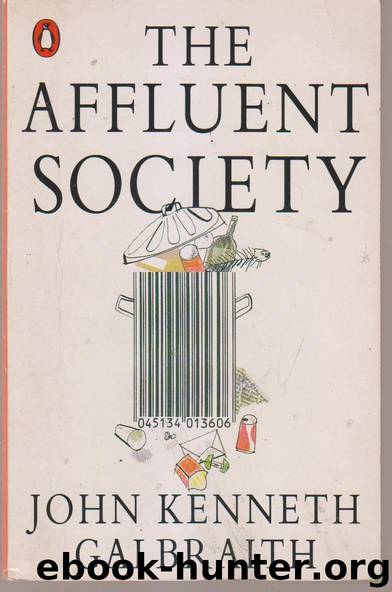The Affluent Society by John Kenneth Galbraith

Author:John Kenneth Galbraith [Galbraith, John Kenneth]
Language: eng
Format: epub
ISBN: 9780395925003
Amazon: 0395925002
Publisher: Mariner Books
Published: 1963-01-01T23:00:00+00:00
IV
Or such was the unchallenged wisdom until recent times. Browning observed that "Jove strikes the Titans down, not when they set about their mountain-piling but when another rock would crown their work." So with production. At the moment when its position seemed invulnerable, when it was supported by the deeply vested interest of conservative executives and liberal intellectuals, cracks were appearing in the façade. In these last years, they have widened. That the preoccupation with production qua production is still formidable, of that there can be no doubt. It has inherited the concern once felt for equality and the poor. It is still powerfully reinforced by the service it renders to economic security. It is still rationalized by an elaborate and traditional, even if meretricious, theory of consumer demand. But, for businessmen, production no longer means secure prestige. For liberal politicians, it is no longer a certain formula for public office.
The prestige of production depends on the prestige of goods. In the more censorious social levels of American society, there has long been a fashionable aversion to gadgetry. (The word gadget is itself a pejorative term for durable goods.) In such circles, shiny rumpus rooms, imaginative barbecue pits, expansive television screens and magnificent automobiles no longer win acclaim. They may even invite mild social obloquy. A degree of shabbiness in personal attire is now sought, and all but universally among the young. Against more output and more jobs is now set the effect on the environment. On occasion, that effect is controlling. We have here a yet small but still significant revolt against goods, and a refusal to allow competitive emulation to be the source of wants.
Even more suggestive is the belief of the businessman that his position in the community is slipping.7 The rise of the public relations industry, which draws its clientele overwhelmingly from among business executives, shows that business achievement is no longer of itself a source of acclaim. At a minimum, the achievement must be advertised. But the first task of the public relations man, on taking over a business client, is to "re-engineer" his image to include something besides the production of goods. His subject must be a statesman, a patron of education, or a civic force. Increasingly, some artistic or intellectual facet of his personality must be found or invented. A businessman who reads Business Week is lost to fame. One who reads Proust is marked for greatness.
These added requirements for esteem are unquestionably related to changing attitudes toward goods. In the early years of the automobile age, it was sufficient for Henry Ford and R. E. Olds that they were makers of cars. What indeed could be a source of more acclaim? Now the automobile has become commonplace. And in the more recherché attitudes, it is even unfunctional in its shape and decoration. It is easy to see why the modern car manufacturer does not enjoy the eminence of a Ford or an Olds.
As noted, the intellectual, along with the public official and
Download
This site does not store any files on its server. We only index and link to content provided by other sites. Please contact the content providers to delete copyright contents if any and email us, we'll remove relevant links or contents immediately.
The Secret History by Donna Tartt(16619)
The Social Justice Warrior Handbook by Lisa De Pasquale(11489)
Thirteen Reasons Why by Jay Asher(7786)
This Is How You Lose Her by Junot Diaz(5768)
Weapons of Math Destruction by Cathy O'Neil(5034)
Zero to One by Peter Thiel(4823)
The Myth of the Strong Leader by Archie Brown(4789)
Promise Me, Dad by Joe Biden(4444)
Stone's Rules by Roger Stone(4415)
Beartown by Fredrik Backman(4414)
How Democracies Die by Steven Levitsky & Daniel Ziblatt(4398)
The Fire Next Time by James Baldwin(4341)
100 Deadly Skills by Clint Emerson(4076)
A Higher Loyalty: Truth, Lies, and Leadership by James Comey(4031)
Rise and Kill First by Ronen Bergman(4012)
The David Icke Guide to the Global Conspiracy (and how to end it) by David Icke(3881)
The Farm by Tom Rob Smith(3871)
Secrecy World by Jake Bernstein(3782)
The Doomsday Machine by Daniel Ellsberg(3730)
